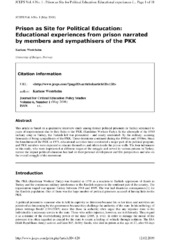Education in a Political Context. A study of knowledge processes and learning sites in the PKK
Doctoral thesis

Permanent lenke
https://hdl.handle.net/1956/3455Utgivelsesdato
2009-02-26Metadata
Vis full innførselSamlinger
- Faculty of Psychology [535]
Sammendrag
This thesis focuses on educational practices within the Kurdistan Workers’ Party (PKK) and how members of the organisation perceive the educational and personal outcome of their participation. The thesis consists of three articles and a longer text (a mantle); showing how the articles are thematically, theoretically and methodologically interrelated. The theoretical foundation of the thesis is Paulo Freire’s perspectives on education (critical pedagogy) and the way he uses concepts such as literacy, critical consciousness, transformation, liberation and change. These perspectives are supplemented with the work of the political theorist Antonio Gramsci who explores concepts related to resistance and collective action, recruitment and identity within the frames of social and political movements. The project is based on sixteen qualitative interviews with PKK members, residing in Europe and North Kurdistan (Turkey), and participatory fieldwork in one PKK camp. The practical and ethical challenges and specific constraints confronting the researcher in fields of political unrest are discussed both in the mantle and in the first article. The article discusses the term zone for deliberation to analytically understand how meaning is being negotiated and re-constructed between parties who struggle to understand each other’s political and cultural positions. The second article asks why thousands of youths during the 1980s and 1990s went to the mountains in order to fight with the PKK and presents what the informants claim to have learned from participation. It seems that in the struggle for personal, social and political change, transformative education represents a major force. In the context of a lack of a relevant educational opportunities for millions of Kurdish youths, the political education of the PKK takes place in a variety of non-formal sites such as the mountains, Diaspora, Kurdish communities and in prisons. Education in prison has had a major impact on the overall Kurdish struggle. The third article therefore discusses how former political prisoners in Turkey organised educational activities in prison in order to educate themselves and fellow prisoners. Historically, family and tribal relationships have been the core of Kurdish social life. In the late 1970s, however, the PKK began to challenge this traditional way of living in addition to liberating its members from Turkish oppression through transformative education. Political education and personal development became important in the struggle. The PKK education benefited not only those who joined the armed struggle, but also members and supporters working in the social, cultural, political or academic field. In addition, the PKK put major emphasis on gender issues, which explains why so many women attended. The women’s army and the women’s party of the PKK have been vanguards for female emancipation within the PKK and for Kurdish women in general. Transnational migration after 1980 strengthened the struggle, by providing opportunities to operate within Diaspora communities. New technology, media and TV channels have become important educational tools. By the use of e-mails, mobile phones, internet or TV, millions of Kurds could rapidly be mobilised for collective action in the streets. Funerals for PKK guerrillas, attacks and killings by the military or security forces are typical examples of incidents that call for Serhildan; popular uprising or mass mobilisations in favour of the PKK. Since the 1990s, even the streets have turned into educational sites where people learn how to communicate and organise. When people participate in emotionally-charged action, the atmosphere often reaches a high energy level, creating a sense of togetherness. In these collective moments, political meaning is created and collective memory established. Collective learning takes place when the “collective participant” discovers the relationship between collective action, political meaning and change, and is able to transfer these experiences to the next collective event. Political education and personal development are rarely mentioned as positive factors in research on the PKK. In this thesis, I have tried to nuance this picture. Even though members of the organisation refer to the PKK “school”, education is not institutionalised, but organised in the mountain camp, in prison, through different media, in the communities and on the streets. This is where the Kurds learn what it means to be Kurdish. Through literacy courses and the development of various skills, they also gain dignity and a sense of empowerment. The informants claim that because of the PKK education, they have become more than they were before, and perceive themselves as better persons. ‘Becoming’ entails the notion of transformation and is linked to ideas about human development, growth and potential. It is a dynamic process. Through participation in collective and individual educational activities, self-evaluation and evaluation by other members, the informants claim to have transformed their lives in ways that empowered them to do and to be through the process of becoming. Therefore, becoming [someone], who is capable of doing something for him- or herself and the people, seems to be the most important outcome of a transformative educational process. Practical educative activities, along with political education in the mountains, prison, streets and communities, have become a school for those who participate.
Består av
Paper I: Policy Futures in Education, 5(3), Westrheim, K.; Lillejord, S., A Zone for Deliberation? Methodological Challenges in Fields of Political Unrest, pp. 373-85. Copyright 2007 Symposium Journals. Reproduced with permission. Published version. The published version is also available at: http://dx.doi.org/10.2304/pfie.2007.5.3.373Paper II: Westrheim, K., 2009, Choosing the Mountains: The PKK as Alternative Knowledge and Identity Project. Full text not available in BORA.
Paper III: Journal for Critical Education Policy Studies, 6(1), Westrheim, K., Prison as Site for Political Education: Educational Experiences from Prison narrated by Members and Sympathisers of the PKK. Copyright 2008 The Author. Published by Institute for Education Policy Studies. Reproduced with permission. Published version. The published version is also available at: http://www.jceps.com/?pageID=article&articleID=120